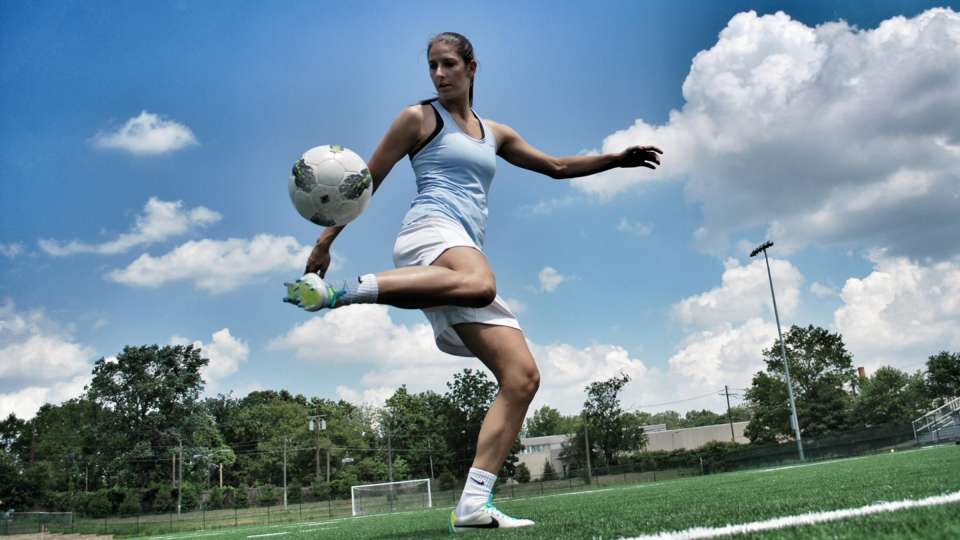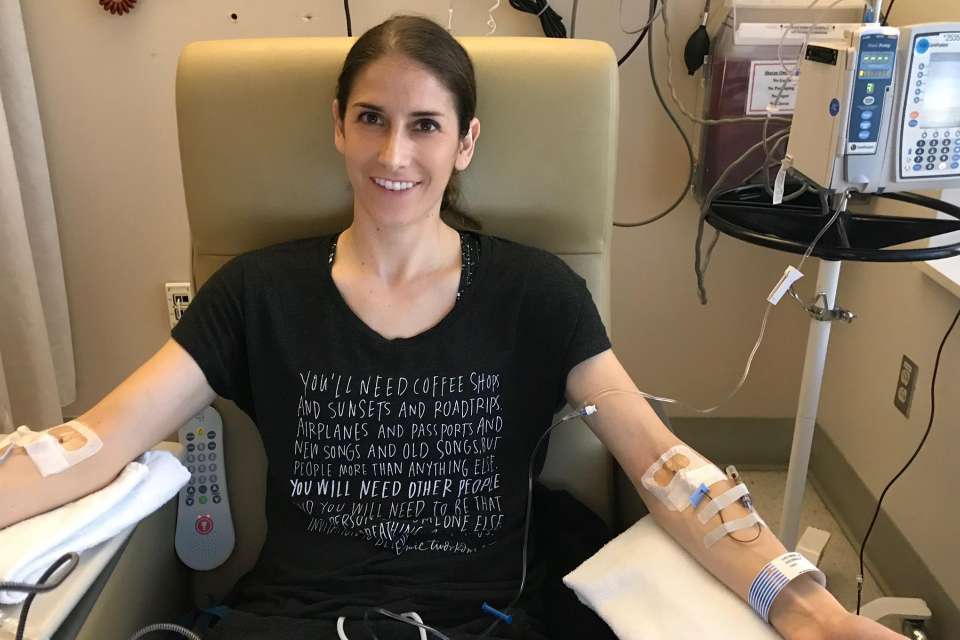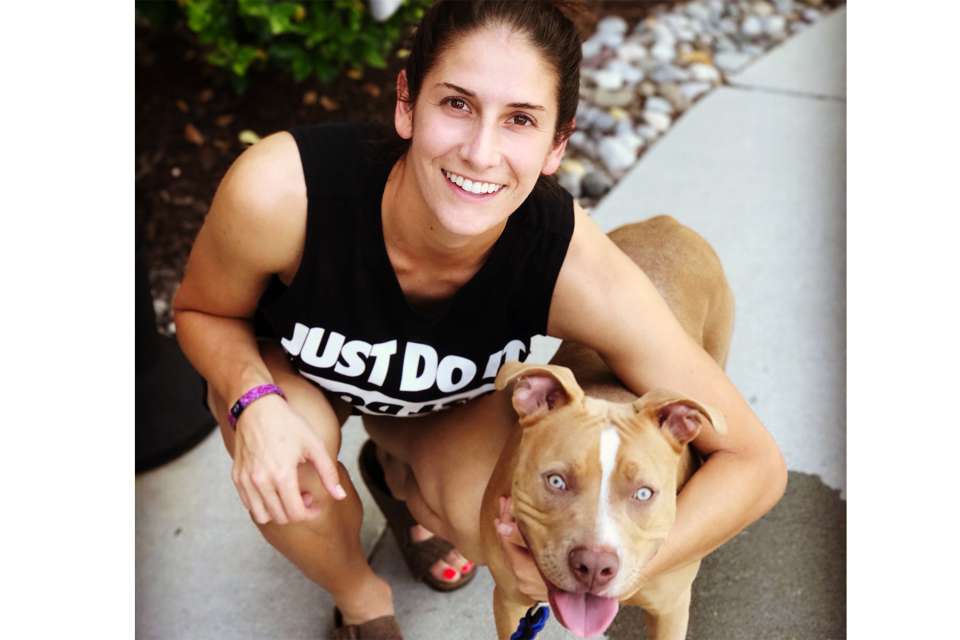Yael Averbuch on Battling Ulcerative Colitis and Finding Balance

No one defies stereotypes about people who have chronic disease quite like Seattle Reign FC defender Yael Averbuch. Currently in her tenth season as a professional soccer player, Averbuch has played throughout the U.S. and around the world and written about her experiences for the New York Times. Looking through her list of awards and accolades (including two NCAA National Championships), you would never know she is also among the estimated 3 million U.S. adults battling inflammatory bowel disease (IBD).
Averbuch was diagnosed with ulcerative colitis (UC) in 2012. UC causes inflammation and ulcers in the colon, which lead to symptoms such as debilitating abdominal pain, frequent bloody diarrhea, fatigue and weight loss.
Averbuch doesn’t have symptoms all the time but instead gets flare-ups that can be unpredictable. After her first flare-up in 2012, she went into remission and was symptom free for several years. Then, last season, she suddenly got the worst flare-up she’s ever had.
Talking with her for the first time, I was struck by how positive and open she is. She shares her experiences with the disease in a conversational, matter-of-fact way on her blog, and if you look through the comments there and on her social media you’ll see countless messages from fans who also have IBD and are grateful that she gives voice to a subject most shy away from.
Despite her positivity, Averbuch’s journey with UC has not been an easy one. Playing through her bad flare-up last season took a toll on her body, forcing her to take a break so she can heal.
I spoke with her about her recovery, how she gets through her worst days, and how she balances her career and her health.

Q: What have you done during recovery to focus on your health but not lose touch with the things you love to do, like soccer?
A: Right now, I’m taking the approach of not pushing myself at all because, to be honest, I’m a bad judge of how I’m feeling and whether or not I should train. My doctor told me that exercise itself isn’t going to make me worse but it can make my life more uncomfortable. On top of having symptoms, if I’m dehydrating myself more during the day that’s potentially dangerous or unhealthy. If I’m exhausting my body or mind, I’m going to be in a deficit. It’s hard for healing to take place if you’re taxing yourself so much when your body is trying to repair.
I did play one full game this season. I traveled with the team on an away trip; that was actually a determining factor in why I’m not doing anything now. I’ve been doing body weight exercises, and I walk and sometimes jog, but most days my body doesn’t feel like doing that right now.
It’s very ambiguous when I’ll be better, which is hard. I’m much healthier than I was last year at this time, but going into remission could take a long time, several months or even a year or two, because of the severity and duration of how bad my flare-up was.
Q: How do you work to balance your career, business and personal goals with your health?
A: I’m not good at balancing it, honestly. As athletes we’re taught our whole lives to push our body through discomfort, but I’m trying to listen to my body and do what’s right for it. I ask myself, “Do I really feel good, or do I just think I should? Do I really need to answer emails right now, or can I leave it until tomorrow?”
It’s been hard for me to find separation between work and life. I enjoy the things in my life that are work and I’ve built my life around loving the work I do; I love playing soccer and I love managing my business.
I also move a lot for my career and there’s a lot of uncertainty and underlying stress. I’ve realized how much my UC symptoms are tied to stress and anxiety in my life, and acknowledgment of how big of a part that plays in my disease is a huge step.
There’s no right answer: Sometimes I can push myself and be totally fine, but there are times I can’t. Dr. Drezner [a team physician for Seattle Reign] has helped me by creating some guidelines to scale back in training and competition if I need to.
Q: It seems like finding balance is something a lot of people struggle with nowadays; we’re always working, or checking emails before bed, or looking at our phones while we watch TV.
A: I’m the poster child for what you’re talking about. In addition to a playing career and being super Type A, I launched my own business a couple years ago. I’d come home and immediately be on my computer and answer emails all night. I was maxing myself out.
I am now very aware in the day if I’ve gone a few hours and not spent some downtime. It’s about awareness to do the things we already do but not be connected to something else, like eating meals and not being on my phone or computer, not feeling like I’m caught up in the spiral of always working and doing something.
Q: How were you able to get through last season while dealing with such a bad flare-up?
A: When I got my heart rate up to a certain level, it shut down my digestion. I was having up to 30 bloody diarrhea bowel movements a day, but during training or playing was the only time I didn’t have diarrhea.
I could play and be fine for hours, then I’d get home and be up all night on the toilet. Sometimes I would even sleep there. The next day I’d take a shower, pump myself up and go play a game, then come back and deal with it again. I told myself I couldn’t be that sick because I could still play the game.
Q: UC is definitely an invisible illness.
A: There’s a lack of understanding about it. I can show up at my team’s training session, I can look and feel OK for two hours, but no one sees the result of that for the rest of the day. I’m sure people are somewhat confused; even if I saw someone like that I would be confused. People are usually pretty supportive, though.
When I walk into the hospital to get my infusions [medicine to suppress the inflammation], I probably look like one of the healthiest people in there: I have muscles, I’m tan. But I’m pretty sick. I actually look pretty bad most days, my skin is messed up from medicine and my hair is not good, but if I go out and put on a little bit of makeup, people ask, “Are you feeling better?” And I’m like, “No, I put on mascara!”

Q: Do you struggle at all to stay motivated?
A: It has been really difficult. I’m inherently a very hopeful, resilient person, but I do deal with days where I feel down and depressed. I’m limited from a lot of the things I love: I can’t play soccer, be social, or eat all the foods I want to eat.
Anything right now where I have to leave the house isn’t relaxing. I have times of needing to use the restroom and my body will literally have one minute before I can’t hold it anymore. If I’m out somewhere, I’ll be watching the restroom the whole time, and if a line forms I get severe anxiety.
Having people who understand what you’re going through is a massive part of healing and being able to cope. It’s so important for mental and physical well-being, and so you’re not going through something alone. I tell my family everything, and my teammates are always a source of joy and laughter. There are so many times I’ve told a disgusting story to a friend and we’ve been able to laugh about it.
Q: What do you do to find joy and relax while you’re recovering?
A: I’m not great at relaxing. Last year, when I was seeing a therapist, he suggested guided meditation. In my natural way of thinking, I was like, “If I do it more, is it better?” He was like, “No, I don’t want you to do this anymore.” My natural instinct was to schedule meditation and max it out, which totally defeats the purpose.
I try to enjoy the small things in life and look forward to little treats during the day, like driving to Starbucks and stopping at the lake, laughing with friends, or laying out in the sun for a bit. I like to just be outside and sit in my backyard, with [my pit bull] Ajax running around. I have a phone notification pop up every day at 4 p.m. to remind me to meditate, which is kind of counterintuitive. I’m limited from a lot of the things I love to do, but it’s about holding on to little bursts of motivation that make me feel good.
And sometimes I just take three, really deep full breaths.

 Healthy ideas for your inbox
Healthy ideas for your inbox





